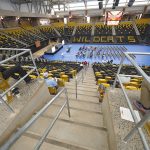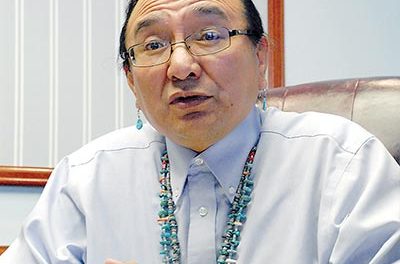
‘Mind-boggling’: Naat’áanii: State-tribal politics halted Medicaid plan
GALLUP
Throughout the pandemic, Naat’áanii Development Corp. has been working with the state of New Mexico to finalize plans for the implementation of the NDC/Molina Healthcare Indian Managed Health Care Entity, passed by Council in January of 2020.
NDC Board Chairman Manley Begay said the contract for the IMCE was near completion before everything blew up when the state of New Mexico brought up the issue of whether or not the Navajo Nation should become a signatory to the contract.
“Naat’áanii Development Corporation has been advised by your administration that the state will suspend its contract negotiations with NDC on January 8, 2021 unless the Navajo Nation is a signatory to the agreement and the Navajo Nation waives its sovereign immunity,” Begay wrote in a Jan. 4 letter to Gov, Michelle Lujan Grisham, urging her to reconsider.
NDC has not received a response from the governor since.
Begay said for the last six months, NDC has put in “countless hours” working with the New Mexico Human Services Department to launch the Naat’áanii-Molina IMCE in the second quarter of 2021.
“We’re on the cusp of creating the first Indian Managed Care Entity in the United States and everything has stopped,” he said. “I feel disheartened that the Navajo people will not be able to reap the rewards of all this work that we’ve done thus far.”
NDC public relations and communications consultant Mellor Willie said the team has been on eight to 10 calls per week for months with various work groups with the state.
However, the state HSD abruptly cancelled all IMCE planning meetings on Jan. 12.
“We found out through an email, which deleted all the appointments for meetings,” said NDC Board Vice Chair Patricia Nez Henderson. “In that email there was a message that they were putting a halt to everything.”
In a written status update to the Resources and Development Committee last week, NDC Interim CEO Robert Joe said that NDC was created as an instrument of the Navajo Nation to be able to fulfill the request of the governor and state, and that Grisham is “essentially disrespecting and not honoring the sovereign will of the Navajo Nation.”
“Governor Grisham, with the support of President (Jonathan) Nez, has delayed implementation of the IMCE … Grisham, at the request of the president’s office, is insisting the Navajo Nation waive its sovereign immunity, assume liabilities, and become Health Information Portability and Accountability Act-compliant in order for implementation to begin,” stated Joe.
Willie said prior to the pause by the state, the team was about to start with “readiness audits” for the IMCE launch.
“All of the different policies and procedures and contracts had gone through review, and we getting to the last approval stage,” he said. “They already committed thousands of hours of personnel resources. To have this held up at the last minute, the last leg of this launch, is confusing.”
‘The governor’s decision’
NDC Secretary/Treasurer Bart Garber said the state had been enthusiastically working to move the IMCE forward, including HSD Secretary David Scrase, up to the point that suddenly Scrase “got pulled in front of the governor and he changed his tune,” not because of the program, but because of “something he was told.”
“Even their lawyers have worked diligently up to the point where they said it’s above their pay grade,” said Garber. “They basically said, ‘This is the governor’s decision.’”
Joe said in addition to the weekly HSD meetings, monthly IMCE leadership meetings have included Grisham, the president’s office, the speaker’s office and select Council delegates.
According to Willie, while the president’s office has been invited to be a part of all of the teleconference meetings, there has been “little to no” involvement from the office.
“In general, the president’s office would not participate in those meetings and they would have separate meetings with the state,” said Health, Education and Human Services Committee Vice Chair Carl Slater. “We would learn of things that they were not communicating to the Council or NDC/Molina. They were exclusively bringing it to HSD.”
Slater confirmed the latest thing that the president’s office brought to the state was that the Navajo Nation had to be a signatory for the contract, but didn’t provide any legal justification for that.
“That prompted the state to then ask the Navajo Nation attorney general whether she believes the Navajo Nation should have to be a signatory to the contract,” he said.
Joe said that at the leadership meeting at the end of November, the governor stated herself that the president wanted to make the Nation a party to the agreement, but there was never anything official in writing to document that.
The Navajo Times could not verify the governor’s statement.
“We’ve never received a formal response from the governor,” said Slater. “It’s always just been in conversations. I think it’s possible they don’t want to commit things in writing that they’ll have to be accountable to.”
Nonetheless, they had to get clarity on who should be party to the agreement, said Joe.
On Jan. 7, Navajo Nation Department of Justice attorney Michelle Begay sent a letter to Scrase clarifying that, “The Navajo Nation does not need to be a signatory to the IMCE contract,” but nothing has changed since that time and NDC has received no further communications from the state.
Slater confirmed if the Nation were to be a signatory to the IMCE, it would have to waive sovereign immunity and agree to dispute resolution in New Mexico state courts.
“That’s not something we’re willing to do, so when they started insisting we do this at the president’s request, that was another black eye in this whole process on NDC, Molina and the Council,” said Slater.
Slater indicated that he fundamentally believes this was “just one more delay tactic” being implemented.
“Everyone knows that it’s the president’s office that is trying to slow this down,” said Slater. “They’re not really invested in this issue. They just want to kill it, that’s the whole thing.”
‘No good answers’
“We’ve been astounded all the way along that we’ve followed the rules and regulations and then suddenly something in the background is getting in the way,” said Garber. “We’re wondering why literally thousands of man- and woman-hours has now been put on the shelf, both for us, Molina and the state.”
Begay said they are also “curious and dismayed” that in the middle of one of the worst pandemics in history, the IMCE would be halted when it could help the health care needs of the Navajo people.
“It could have alleviated conditions perpetuated by COVID-19,” said Begay.
“We’re in the midst of a pandemic and there’s still so much that still needs to happen in terms of creating a healthier environment for the Nation,” said Nez-Henderson. “The IMCE could certainly help in that capacity. Hundreds and hundreds of hours have been poured into making this very culturally appropriate for Native communities. It’s unlike any other plan out there.”
Other opportunities have also been lost such as shoring up the Navajo economy and bringing income to the Navajo Nation government, said Begay.
It is estimated that if 50,000 Navajo tribal members in New Mexico enrolled in the IMCE it could yield around $468 million in revenues.
“I think there were some missed opportunities here by the IMCE not being established,” said Begay. “It’s mind-boggling to me.”
Willie explained that Section 17 corporations like NDC were created specifically to execute commercial businesses such as the IMCE project.
“When Congress created the Indian Reorganization Act of 1934, they created Section 17 because tribes need to a way to support governmental affairs,” he said. “Because we don’t have a tax base, there needed to be some way for us to generate revenue and create corporations that protected the sovereign immunity and treasuries of the tribe while empowering them to raise revenue.”
Garber said in addition to generating revenue, the managed care entity would create numerous jobs and professional opportunities on the reservation.
He indicated that now some of the leaders in the New Mexico Legislature are preparing legislation to attempt to persuade Grisham to change her mind.
“She’s kind of alone in this and we’re astounded,” said Garber. “There’s no good answer.”
Neither Grisham nor Scrase responded to requests for comment from the Navajo Times as of press time Wednesday.
“Ultimately, there’s nothing we can do,” said Henderson. “We’re halted. This was going to be a great opportunity for our Nation and politics got in the way and it’s just really frustrating. We’re kind of at a loss for words as to what’s going on.”







 Highway 264,
Highway 264, I-40, WB @ Winslow
I-40, WB @ Winslow